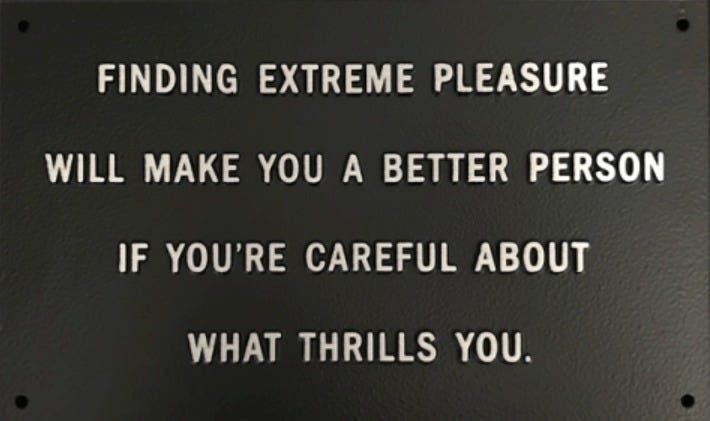Is there pleasure outside of capitalism?
Pleasure activism and the capitalism sabbath. Otherwise known as ... the Sabbath.
I’ve been reading Pleasure Activism by Black activist adrienne maree brown, and it’s blowing my mind.
brown is writing about activism against white supremacy, capitalism, and patriarchy. Or more accurately, she is writing about not fighting against those things. Instead, move towards something you desire more. Yes is the way; let go of what were taught to want by society, and engage the future with the authentic desire welling within. I can’t help but see pleasure activism with a Financial Freedom lens:
Pleasure activism is the work we do to reclaim our whole, happy, and satisfiable selves from the impacts, delusions, and limitations of oppression and/ or supremacy. [Douglas - i.e. capitalism]
Moderation is key. The idea is not to be in a heady state of ecstasy at all times, but rather to learn how to sense when something is good for you, to be able to feel what enough is. Related: pleasure is not money. Pleasure is not even related to money, at least not in a positive way. Having resources to buy unlimited amounts of pleasure leads to excess, and excess totally destroys the spiritual experience of pleasure.
Pleasure activism is not about generating or indulging in excess… I think because most of us are so repressed, our fantasies go to extremes to counterbalance all that contained longing. Pleasure activism is about learning what it means to be satisfiable, to generate, from within and from between us, an abundance from which we can all have enough.
Part of the reason so few of us have a healthy relationship with pleasure is because a small minority of our species hoards the excess of resources, creating a false scarcity and then trying to sell us joy, sell us back to ourselves.
And so many of us have been trained into the delusion that we must accumulate excess, even at the cost of vast inequality, in order to view our lives as complete or successful.
A central aspect of pleasure activism is tapping into the natural abundance that exists within and between us, and between our species and this planet. Pleasure is not one of the spoils of capitalism. It is what our bodies, our human systems, are structured for; it is the aliveness and awakening, the gratitude and humility, the joy and celebration of being miraculous.
So rather than encouraging moderation over and over, I want to ask you to relinquish your own longing for excess and to stay mindful of your relationship to enough.
There is no way to repress pleasure and expect liberation, satisfaction, or joy.
Gratitude is part of pleasure too.
An outer solution never solves an inner problem
There’s so much in Pleasure Activism with connects to what I write about. brown writes about pleasure very similarly to a core idea in Financial Freedom, lagom: the deep satisfaction of enoughness instead of the craving for more. But that is hard for the ego.
The ego wants to feel both separate and superior. It is defended and self-protective by its very nature. — Richard Rohr
My current FF cohort is talking about is how much their desires are formed by capitalism, molded in a way that would seem unnatural to previous generations. We have ever-escalating demands for separateness, comfort, and novelty. We live in “single family homes,” a innovation new to humanity in the last 70 years. (Some of us, like me, live alone, which would have been a horror to previous humans) We live, work, and commute in climate-controlled houses, offices, and cars. Our need for novelty and stimulation has accelerated to a ahistorical degree. Last week I wrote that 70 years ago, screens and the Internet did not exist, but now, we spend 8 hours a day, half our waking lives, on them. We have a need to feel continually stimulated.
Blaise Pascal believed that “all of humanity’s problems stem from man’s inability to sit quietly in a room alone.” Portland intimacy coach Anna Marti puts it: “we have a diminished capacity for discomfort.” We hate, more than anything, being bored. A University of Virginia study showed that almost 50% of college students would rather shock themselves with electricity than be silent and without distraction for 15 minutes. Crazy, right, but what do you do when you’re bored? If you’re like me, you pull out a phone, or read something on the internet, or listen to a podcast. You text a friend or find “something to do.” We overwork and overspend to accumulate excess, keep busy, and chase experiences, just to stay outside of ourselves.
The environmental destruction and vast inequality we’re facing today is caused by this constant need for more separateness, comfort, and novelty. We’re not going to solve climate change with carbon credits and electric vehicles. We’re not going to become more socially just through DEI committees and Congressional elections. An outer solution never fixes an internal problem. Real transformation comes from us re-cognizing (seeing again, differently) that we already have enough. Pleasure, sufficiency, and connection (i.e. the primary satisfactions) already exist. We already live in grace. Everything we’ve ever gotten is a gift. To get there, we have to go down, and in. We have to be able to see, and sit with our discomfort. In Eastern Orthodox mysticism, the darkness is the most illuminating thing of all, the dazzling ray of divine darkness.1 Capitalism wants to capitalize on the avoidance of the discomfort; there is always a temporary solution, a salve, to make it go away. But if we can be with it, glories await.
Take a Capitalism Sabbath
Pleasure is not money. Pleasure is not even related to money, at least not in a positive way. - adrienne maree brown
Can we find pleasure outside capitalism? People have recently started taking a “technology sabbath,” a day break from our devices to find the deep aliveness that existed before the television and the internet.2 What if we took it further? What if we took a capitalism sabbath? A day where we go on a capitalism boycott. Twenty-four hours, sunset to sunset, where we, in the immortal words of Lloyd Dobler, don't sell anything, buy anything, or process anything made, bought, or sold.
I grew up Seventh Day Adventist. On that day, you're not allowed to work, sell, or spend. You're not allowed to watch TV or be on any electronics. A rabbi-in-training once told me Jews observing the Sabbath are only allowed to do five things:3
Spend time with family and friends
Eat yummy food
Nap
Make love4
Worship God
If you look at this list, isn’t it pretty sweet? Nothing productive. Nothing ego-enhancing. What else would you want?5
The great 20th century rabbi and scholar Abraham Heschel wanted people to understand that the Sabbath isn’t a prohibition on most life activities, but “a sanctuary in time” that protect the best things in life. The things you’re allowed to do on the Sabbath: spending time with friends, eating yummy food, napping, making love, and worshipping God are, according to Heschel, the things we were created for, the things we labor on the other days for, and the things we should cherish. Working spending, and looking at our devices are only poor substitutes. We need to step away from them to make time for what we really want.
The golden hour has secrets to reveal. Be alert for merriment. Be greedy for glee. With your antic companions, explore the frontiers of conviviality. Go in quest of jubilation’s mysterious blessings. Be bold. Revere revelry. — Rumi
Important to note: finding a day a week where you didn’t work, buy, or sell is not simply a way to avoid burnout. It’s not so you can rest up and jump back into the work/spend cycle better/faster/harder the other six days. No, the point is to find the deeper yes within you. To find kairos and flow. Channeling adrienne maree brown, capitalism sabbath is pleasure activism. And capitalism sabbath is really just Sabbath, if you really look at it. In other words, Sabbath is pleasure activism.
Marina Keega wrote, “I want enough time to be in love with everything.” In the end, that’s what we’re talking about, isn’t it? Financial Freedom is the ownership of your time and life energy. Capitalism and the work/spend cycle is a theft of your time. By working, buying, and selling, or by staying on your devices, you are distracting yourself, as per my friend Vanda Marlow, from “the spontaneous arising of life living itself through you.” Quakers describe it as “receiving God.” Mystics describe it as “verbing God.” This is a place where the ego recedes and you find connection with it all. And remember, capitalism is nothing but an ego game. Every once in a while, create a sanctuary in time and take a break from it. Once a week, be a pleasure activist.
Within you, there is a great desire. Within you, there is a life unknown, awaiting. Come home to yourself. Yes is the way.
The time will come
when, with elation
you will greet yourself arriving
at your own door, in your own mirror
and each will smile at the other's welcome,
and say, sit here. Eat.
You will love again the stranger who was your self.
Give wine. Give bread. Give back your heart
to itself, to the stranger who has loved you
all your life, whom you ignored
for another, who knows you by heart.
Take down the love letters from the bookshelf,
the photographs, the desperate notes,
peel your own image from the mirror.
Sit. Feast on your life.— Love after Love, Derek Walcott
As my friend Mark Arey put it, most Christians want grace to be light and airy. “Jesus is a candy bar.” But grace is much more complex and paradoxical than that.
What I find interesting for myself is that going a day without my phone, computer, or TV is hard. It’s difficult to deny myself the easy distraction of being constantly lost in my thoughts. Although we glorify it, presence is hard.
Here are a list of things orthodox Jews can’t do on the Sabbath.
A boss once told me once that the commandment is to make love to your spouse 5 times(!) on the Sabbath.
Incidentally, these are the very things that Financial Freedom makes space for. One possible extra thing: dharma, or a sense of purpose.






Another banger of an article Douglas!
How true is this:
"We overwork and overspend to accumulate excess, keep busy, and chase experiences, just to stay outside of ourselves.'